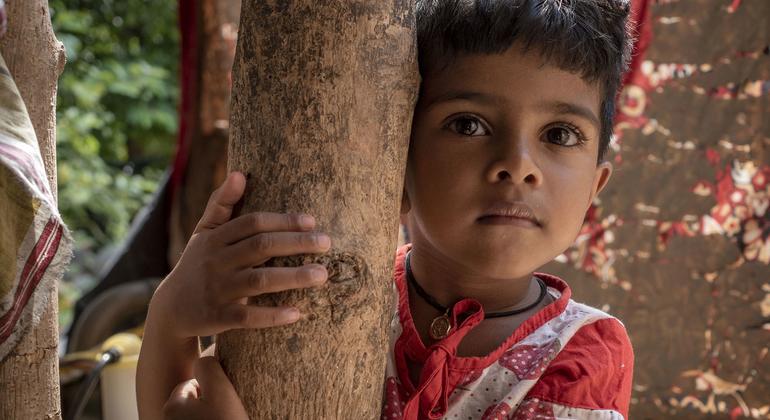
As prices keep healthy meals out of reach, some 61 per cent of households are regularly using coping strategies to cut down on costs, such as reducing the amount they eat and consuming increasingly less nutritious meals.
And with opportunities to make enough income in the medium to long-term decreasing for an estimated 200,000 families, the UN food relief agency anticipates that even more people will turn to these coping strategies as the crisis deepens.
“These days, we don’t have a proper meal but eat only rice and gravy,” one woman told WFP.
Expectant mothers
WFP is warning that a lack of nutrition has grave consequences for pregnant women, putting both their own and their children’s health at risk.
“Pregnant mothers need to eat nutritious meals every day, but the poorest find it harder and harder to afford the basics,” WFP Deputy Regional Director for Asia and the Pacific Anthea Webb said last month.
She told a local television station that by skipping meals, pregnant women were putting themselves and their children’s health at risk in a way that “carries throughout your life”.
To combat the food crisis and its effect on malnutrition, WFP has been distributing monthly food vouchers to pregnant women, valued at $40, in some of the poorest neighbourhoods, alongside antenatal care provided by the local government.
Debilitating inflation
Amidst a staggering 57.4 per cent inflation rate, steeply increasing food prices have crippled the population’s ability to put sufficient and nutritious meals on the table, rendering two in five households without adequate diets.
The food security situation is worst among people working in the farming estates sector – such as large tea plantations – where more than half of households are food insecure, according to WFP.
In all measures of food insecurity and coping strategies, these households have consistently poorer outcomes than urban and rural populations.
While urban households are depleting savings to cope for now, families on rural estates are already turning to credit, in order to buy food and other necessities.
“Poor families in cities and those who work on estates have seen their incomes plummet while market prices have soared,” the WFP official said.
A gloomy picture
Sri Lanka is suffering its worst economic crisis since gaining independence in 1948, which comes on the heels of successive waves of COVID-19, threatening to undo years of development progress and severely undermining the country’s ability to achieve the Sustainable Development Goals (SDGs), said WFP.
A current oil supply shortage has forced schools and government offices to close until further notice.
Reduced domestic agricultural production, a lack of foreign exchange reserves, and local currency depreciation, have fuelled the shortages.
The economic crisis will push families into hunger and poverty – some for the first time – adding to the half a million people who the World Bank estimates have fallen below the poverty line because of the pandemic.
WFP steps up
To address the downward spiralling situation, last month WFP launched a $60 million emergency appeal for food and nutrition to assist three million of the most at-risk Sri Lankans.
“We must act now before this becomes a humanitarian catastrophe,” warned WFP chief David Beasley in a tweet.
To date, the agency has delivered 88 per cent of the first batch of 2,375 vouchers it has available, and targeted three million people to receive emergency food, nutrition, and school meals, until December.
As prices keep healthy meals out of reach, some 61 per cent of households are regularly using food-based coping strategies, such as reducing the amount they eat and consuming increasingly less nutritious food.
And with the medium- to long-term income-generating capacities at severe risk for an estimated 200,000 families, the UN food relief agency anticipates that even more people will turn to these coping strategies as the crisis deepens.
“These days, we don’t have a proper meal but eat only rice and gravy,” one woman told WFP.

© WFP/Josh Estey
Families living in rural Sri Lanka are struggling to make ends meet.

